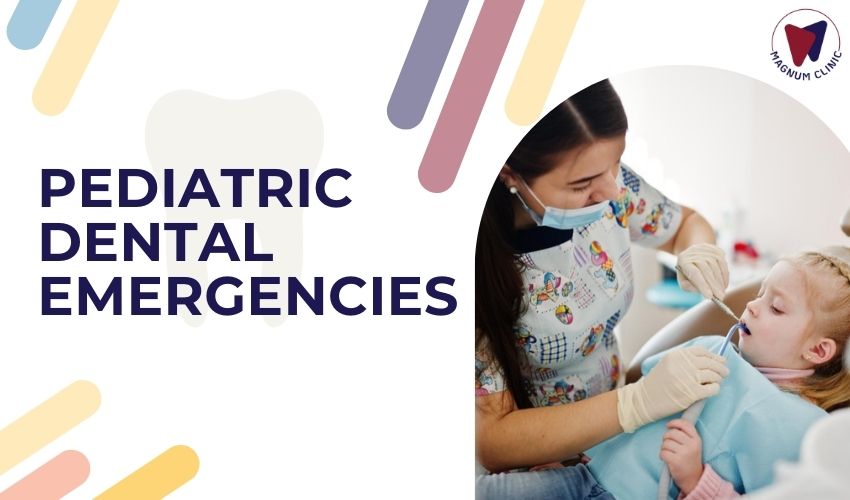Common Dental Emergencies in Children and How to Handle Them

As a parent, watching your child's teeth grow since infancy can be a rewarding experience. However, it can also be challenging when they experience tooth pain, tooth loss, or any other dental emergency in children. In these situations, it's essential to know what to do and whom to contact.
Tips On How To Handle Dental Emergency In Children
Injury To Tongue, Cheek, or Lips
Children may accidentally bite their lips, tongue, or cheek while eating or due to a fall. In such cases, stay calm and follow these steps:
- Clean the affected area with water.
- Apply a cold compress to reduce swelling.
- If bleeding, apply pressure using a fresh gauze on the affected area.
- In severe cases, contact your emergency paediatric dentist for an immediate check-up.
Dental Avulsion or Knocked-Out Tooth
Dental avulsion or a knocked-out tooth can occur due to trauma, such as falling on the face or getting hit by a ball. If this happens:
- Locate the tooth and bring it to the paediatric dentist.
- Avoid touching the tooth's roots, as this can make reattachment difficult.
- Preserve the tooth in milk or saliva for reimplantation.
- Visit an emergency paediatric dentist promptly to increase the chances of successful reimplantation.
Dental Abscess
A dental abscess is a severe infection that forms in the tooth's roots, resulting in a pocket of pus. If left untreated, it can cause:
- Persistent, severe tooth pain
- Tooth sensitivity
- Fever
- Pain while chewing
- Swelling of the face
- Swelling of the lymph nodes in the head and neck region
- Breathing difficulties
Seek treatment for a dental abscess as early as possible to prevent it from spreading to adjacent teeth.
Dental Decay
Tooth decay is often overlooked as a dental emergency in children, but it can cause severe problems if left untreated. To prevent dental decay:
- Schedule regular dental visits with your paediatric dentist from the time their first teeth erupt.
- This will help detect dental decay at an early stage before it causes infection or pain.
Tooth Sensitivity
Mild sensitivity to hot or cold substances is common. However, if your child complains of severe sensitivity, it could indicate tooth decay or injury. In these cases:
- Visit your emergency paediatric dentist to identify the underlying cause and provide treatment.
Lost or Loose Fillings
If a dental filling becomes loose or lost:
- Seek immediate dental care to replace the filling and prevent tooth from food accumulation in the space.
Read Also : Wisdom Tooth Extraction
Broken or Chipped Tooth
A broken or chipped tooth can occur due to a fall, sports injury, or other reasons. If this happens:
- Apply a cold compress to the affected area to reduce swelling or bleeding.
- Monitor the tooth for any signs of a severe issue, such as a change in colour.
- Visit your emergency paediatric dentist promptly, even if the broken tooth does not show immediate signs of a severe problem.
Tooth Displacement
If a tooth is displaced from its natural position but not completely knocked out:
- For primary or milk teeth, the issue usually resolves by itself.
- For permanent teeth, visit an emergency paediatric dentist as soon as possible to fix the problem.
Tooth Pain
Tooth pain is the most common dental emergency in children. If your child experiences tooth pain:
- Have them rinse their mouth with warm water to dislodge any stuck food particles.
- If the pain persists, visit your emergency paediatric dentist to identify the cause and provide treatment.
Broken Jaw
If you suspect your child's jaw is broken, seek immediate help from an emergency paediatric dentist. Symptoms of a broken jaw includes:
- Swelling or bruising of the chin, lips, or gums
- Missing or loose teeth
- Nausea and vomiting
- Pain or a lump on the jaw below the ear
- Tingling sensation or numbness in the chin or lower lip
- In extreme cases, difficulty breathing, eating, and opening the mouth
The treatment for a broken jaw depends on the extent of the injury. Common treatments include wiring the jaw to hold it in position, while in more severe cases, surgery may be required to reposition the jaw.
Conclusion:
Dental emergencie in children can be distressing for both the child and the parent. Knowing how to handle these situations and when to call your emergency paediatric dentist is crucial for ensuring your child receives the appropriate care. By being prepared and following the tips outlined in this article, you can help minimise the impact of dental emergencies on your child's oral health.
For any further assistance, please visit our dental clinic or call us at +971 5433 63340
